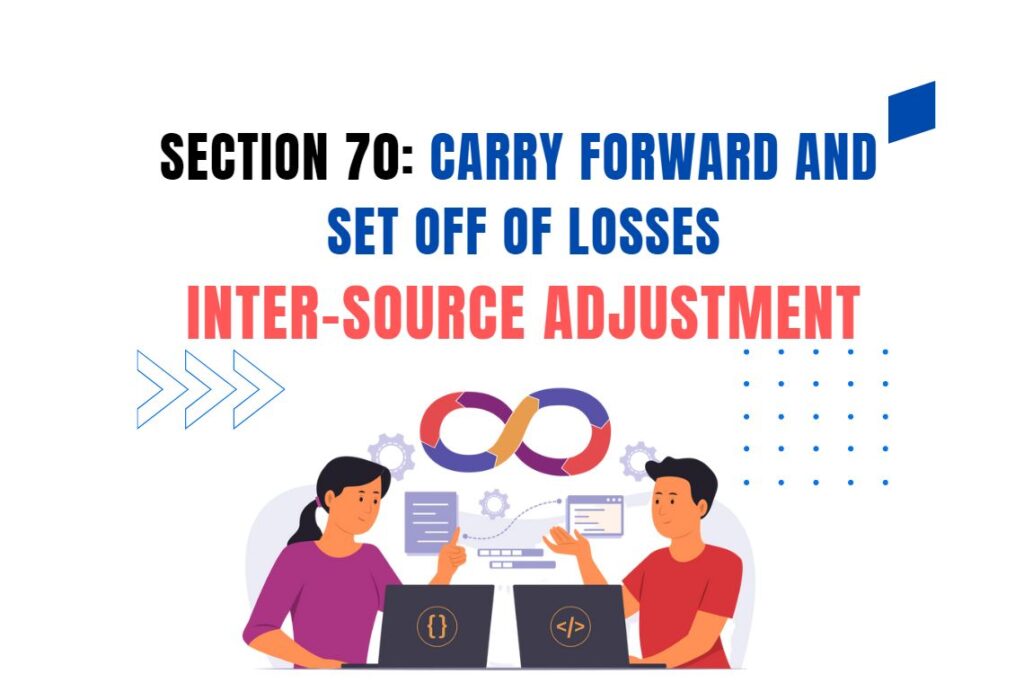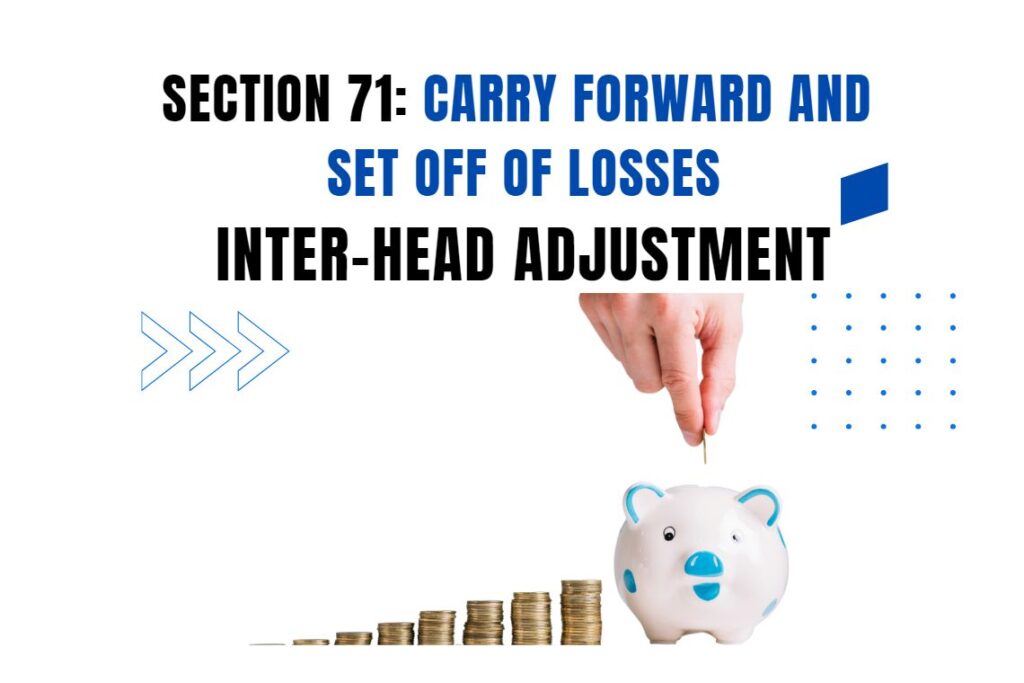1. Introduction to Section 70 –
The Indian Income Tax Act, 1961, provides various provisions for the computation of income and the determination of tax liability. One such provision is Section 70, which deals with inter-source adjustment or the set-off of losses from one source against income from another source under the same head of income.
Under the provisions of Section 70, if an assessee has incurred a loss under any source of income, such a loss can be set off against income from any other source under the same head of income. This means that if an individual has income from multiple sources such as salary, house property, business, or capital gains, the losses from one source can be adjusted against income from another source.
This provision is particularly beneficial for taxpayers who have incurred losses in a particular source of income and have income from other sources within the same head. By setting off the losses against the income, the overall tax liability can be reduced, resulting in a lower tax burden.
However, there are certain conditions that need to be fulfilled for availing the benefit of inter-source adjustment under Section 70:
- The losses and income should be under the same head of income. For example, losses from house property can only be set off against income from another house property.
- The losses should be incurred in the same assessment year in which the income is earned. The losses cannot be carried forward or set off against income of subsequent assessment years.
- The losses can be set off against income from any other source under the same head. For example, if an individual has a loss from a business and income from a house property, the loss from the business can be set off against the income from the house property.
- The losses can be set off against income from any other source under the same head, even if the income is exempt from tax. For example, if an individual has a loss from a business and exempt income from agricultural activities, the loss from the business can be set off against the exempt income.
- If the losses cannot be fully set off in the same assessment year, the remaining losses can be carried forward to the subsequent assessment year and set off against income from the same source.
| Example:
Let’s say you have two house properties: Property A generates rental income of Rs. 50,000, and Property B generates a rental loss of Rs. 30,000. Under Section 70, you can set off the loss of Rs. 30,000 from Property B against the income of Rs. 50,000 from Property A within the “Income from House Property” head. As a result, you will only be taxed on the net income of Rs. 20,000 (Rs. 50,000 – Rs. 30,000). |
It is important to note that the set-off of losses under Section 70 is different from the carry forward and set off of losses under Section 71. While Section 70 allows for the set-off of losses from one source against income from another source under the same head, Section 71 deals with the carry forward and set off of losses from one assessment year to another.
The provisions of Section 70 play a crucial role in reducing the tax liability of taxpayers who have incurred losses in a particular source of income. By allowing the set-off of losses against income from another source under the same head, the Indian Income Tax Act, 1961, provides relief to taxpayers and ensures a fair and equitable tax system.
2. General Rule of Section 70 –
If the net result for any assessment year, in respect of any source under any head of income, is a loss, the assessee is entitled to have the amount of such loss set off against his income from any other source under the same head of income for the same assessment year.
Where the net result for any assessment year in respect of any source, falling under any head of income other than “Capital Gains “, is a loss, the assessee shall be entitled to have the amount of such loss set off against his income from any other source under the same head. This may also be referred to as intra-head adjustment.
For example, if the assessee has two houses and the net income from one house is Rs.4,80,000 while from the other house there is a loss of Rs.3,00,000, the loss shall be adjusted against the income (as both fall under the same head, i.e., ‘Income from house property’) and after set off, the income under the head ‘income from house property’ shall be Rs.1,80,000.
3. Exceptions of Section 70 –
The following are the Exceptions to be aforesaid Rule :-
However, there are certain exceptions to this rule. In the following cases loss from one source cannot be adjusted against income from another source of income although it falls under the same head:
(a) Loss from a Speculation Business:
As per section 73, any loss, in respect of a speculation business carried on by an assessee, shall be set off only against income of another speculation business. It cannot be set off from non-speculative business income, although speculation business also falls under the head ‘profits and gains of business or profession’. However, a business loss can be set off against income from speculation business but vice versa is not possible.
| What is a speculation business:
To know what is speculative business we must first know what is a speculative transaction. According to section 43(5) “Speculative transaction” means a transaction in which a contract for the purchase or sale of any commodity including stocks and shares, is periodically or ultimately settled otherwise than by the actual delivery or transfer of the commodity or scrips. |
(b) Loss of a Specified Business referred to in Section 35AD:
As per section 73A, any loss computed in respect of any specified business referred to in section 35AD (e.g., business of cold chain facility, business of building and operating hotel, business of warehouse for storage of agricultural produce, etc.) shall not be set off except against profit or gains, if any, of any other specified business. It cannot be set off from any other business income.
(c) Loss from the activity of Owning and Maintaining Race Horses:
As per section 74A, the loss incurred by the assessee, in the activity of owning and maintaining race horses, shall only be set off against the income of such activity. It cannot be set off against the income from any other source.
(d) Loss on account of Lottery, etc. cannot be set off against winnings from Lotteries, Crossword Puzzles, Card Games, etc.:
No expenditure or allowance is allowed from winnings from lotteries or crossword puzzle, etc. Similarly, no loss from any lottery, card games, races, etc. is allowed to be set off from the income of the winnings of lotteries, crossword puzzles, card games, races, etc.
(e) Loss from a Source which is Exempt:
Loss incurred by an assessee from a source, income from which is exempt, cannot be set off against income from a taxable source.
(f) Capital losses:
Short-term capital loss can be set off from any capital gain (long-term or short-term) but long-term capital loss can now be set off only against long-term capital gain.
Capital loss worked out by assessee with indexation can be set off against long-term capital gains computed without indexation.
(g) Loss arising from the purchase and sale of securities not to be allowed in certain cases [Section 94(7)]:
Where—
(i) any person buys or acquires any securities or unit within a period of three months prior to the record date; and
(ii) such person sells or transfers such securities within a period of three months after such date or transfers such units within a period of 9 months after such record date; and
(iii) the dividend or income on such securities or unit received or receivable by such person is exempted,
then, the loss, if any, arising to him on account of such purchase and sale of securities or unit, to the extent such loss does not exceed the amount of dividend or income received or receivable on such securities or unit, shall be ignored for the purposes of computing his income chargeable to tax.
Note.—W.e.f. 1.4.2020, dividend or income on such securities or unit received or receivable is now taxable in the hands of the recipient and as such, section 94(7) is not applicable.
(h) Bonus Stripping [Section 94(8)]:
Where:
(i) a person buys or acquires any units within a period of three months prior to the record date; and
(ii) such person is allotted or is entitled to additional units on the basis of such units without making any payment; and
(iii) he sells all or any of such units while continuing to hold all or any of the additional units within a period of 9 months after such date,
then, the loss, if any, arising to him on account of such purchase and sale of units shall be ignored for the purpose of computing his income chargeable to tax.
4. Other Points of Section 70 –
The following points should be considered —
- Before adjusting loss under section 71, one has to set off the loss under section 70
- Barring the aforesaid cases, any loss can be set off against income under other heads of income for the same year.
For instance,
- loss under the head “Income from house property” can be set off against business income, capital gains, salary income or income from other sources;
- business loss can be set off against property income, capital gains or other income;
- a loss under the head “Income from other sources” [not being from the activity of owning and maintaining race horses] can be set off against salary income, property income, business income or capital gains.
- No order of priority is given in the Act. One should try to first set off those losses which cannot be carried forward to the next year.
4. Barring the cases discussed in para 134.2, in all other cases a loss has to be first adjusted against available income under other heads of income. No option is available to set off a loss or not to set off a loss.






